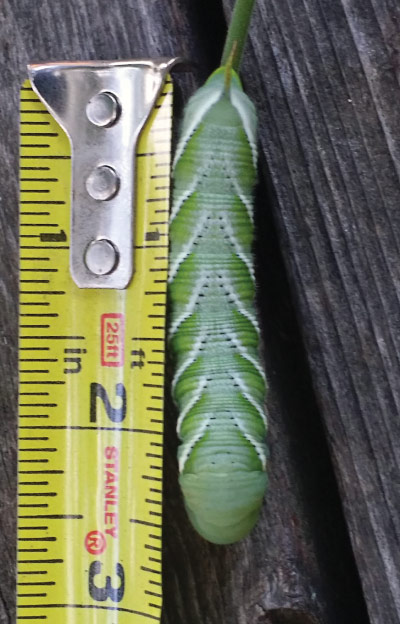It's the Small Things that Add Up
 |
|
Tomato hornworm. Photo provided by Jennifer Hashley. |
“Wow, I didn’t know such a small thing could do so much damage!” This is a common phrase heard in the field when working with new and beginning producers in their first season on our incubator training farms.
From flea beetles creating “buckshot” holes in all things brassicas, to cabbage root maggots burrowing mazelike tunnels into hakeurei turnips, and the infamous Colorado potato beetles and their voracious larvae taking down a potato crop practically overnight, there is a lot to learn about the pests, their life cycles, and the many control options available to diversified vegetable producers.
At the New Entry Sustainable Farming Project (https://nesfp.org/), we introduce new and beginning farmers to IPM, the toolbox that contains many tools and techniques to manage pests. New Entry promotes sustainable, regenerative agricultural practices, such as IPM, which start with the soil. We train farmers on balancing nutrients in the soil, using cover crops, and adding compost to build the health, tilth, and resiliency of the soil that feeds their crops. If producers start with a solid foundation of good soil health, then plants are far more likely to be healthy and robust and less susceptible to pests and disease. This is the preventive part of IPM that many people fail to understand.
We also promote heavy use of other types of cultural practices like carefully selecting disease-resistant crop varieties, active crop rotation among diverse crop families, good weed management, using floating row covers, introducing and protecting habitat for beneficial insects, avoiding overwatering through the use of drip irrigation and water conservation practices, planting trap crops, and learning about pest life cycles to potentially delay or alternate planting dates. We teach growers to manage risk by planting extra seeds to provide a “buffer,” to have enough high-quality product to sell, even if some crops experience pest damage.
Many new and beginning farmers are eager to practice organic agriculture even if they do not pursue the USDA organic certification label. Sometimes this is incorrectly interpreted to mean “no spray” and new producers are reticent to apply organic-approved pesticides or fungicides to protect their crops in the event of a significant disease or pest infestation. This is an opportunity for education. New Entry provides incubator farm space to multiple growers sharing a common field. We encourage producers to control pest populations for the sake of the multiple producers who share the land and who may have different approaches to managing their crops. If late blight is forecast or found to be infecting a tomato crop in one farmer’s plot, then we make sure all producers are working together to provide coverage for the crops. Too often, one producer can be a vector for a disease that spreads to multiple other farms, even when those farmers are working hard to apply preventive controls.
Incubator farm support includes access to multiple trainings for practical skills. We host an annual pest management workshop. We train producers to calibrate backpack sprayers, to learn the control products and preventive sprays available for particular pests and crops, to understand how to read labels, as well as to keep records and watch for re-entry and days-to-harvest intervals. Our weekly field scouting support provides technical guidance to producers on implementing and monitoring cultural practices, advising on sprays when needed, and educating producers about alternative management practices. Together, New Entry producers understand that even the “small things” can add up.
— Jennifer Hashley, Tufts University
The Northeastern IPM Center promotes integrated pest management for reducing risks to human health and the environment. If republishing our news, please acknowledge the source (“From Northeast IPM Insights”) along with a link to our website.
